<< Previous | Displaying results 5061-5070 of 6772 for "" | Next >>
Soviet prisoners of war receiving their meager rations. More than three million Soviet prisoners of war died in German custody, mostly from malnutrition and exposure. Rovno, Poland, 1941. Second only to the Jews, Soviet prisoners of war were the largest group of victims of Nazi racial policy.
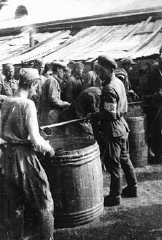
Dugouts which served as living quarters for prisoners in Stalag 319—a Nazi-built camp for Soviet prisoners of war. Chelm, Poland,1941–44.
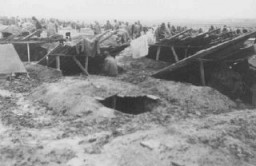
Interrogation of Soviet prisoners of war by German soldiers upon arrival at a prison camp. Lida, Poland, 1941.
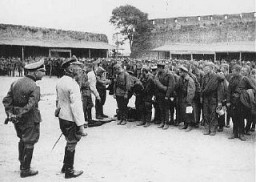
Photograph from a series taken by a guard in the Soviet prisoner-of-war camp of Belzen bei Bergen, and numbered in Roman numerals by the American officer, Lt. van Otten. The camp held approximately 10,000 POWs, most of whom came from Fallingbostel, 10 km away. When they fell ill, they were marched to Belsen. At Belsen, they were starved, often given only a soup made of field beets. This photo shows Soviet POWs assembled at the camp. Germany, 1941–45. Second only to the Jews, Soviet prisoners of war…
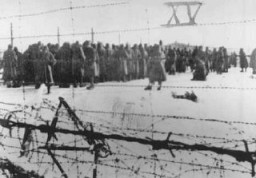
Soviet prisoners of war wait for food in Stalag (prison camp) 8C. More than 3 million Soviet soldiers died in German custody, mostly from malnutrition and exposure. Zagan, Poland, February 1942. Second only to the Jews, Soviet prisoners of war were the largest group of victims of Nazi racial policy.
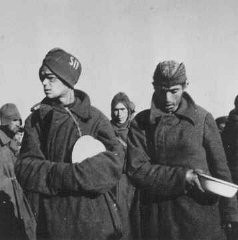
Columns of Soviet prisoners of war. Soviet Union, September 15, 1942. Second only to the Jews, Soviet prisoners of war were the largest group of victims of Nazi racial policy.
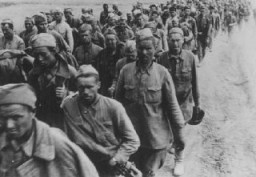
Sack of wood flour (finely powdered wood or sawdust) used to make substitute bread. The official ration of this "bread" for Soviet prisoners of war was less than 5 ounces a day. Deblin, Poland, 1942 or 1943.
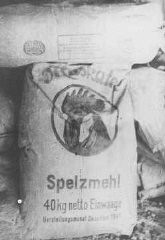
Wounded Soviet prisoners of war await medical attention. The German army provided only minimal treatment, and permitted captured Soviet personnel to care for their own wounded using only captured medical supplies. Baranovichi, Poland, wartime.
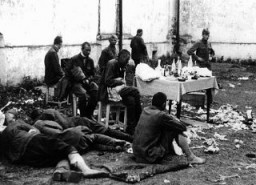
Wounded Soviet prisoners of war. The German army provided only minimal treatment, and permitted captured Soviet personnel to care for their own wounded using only captured medical supplies. Baranovichi, Poland, wartime.
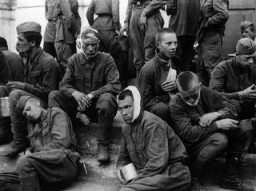
Two malnourished Soviet prisoners of war, survivors of the Hemer prisoner of war camp in western Germany. More than three million Soviet prisoners of war died in German custody, mostly from malnutrition and exposure. Hemer, Germany, April 29, 1945.

We would like to thank Crown Family Philanthropies, Abe and Ida Cooper Foundation, the Claims Conference, EVZ, and BMF for supporting the ongoing work to create content and resources for the Holocaust Encyclopedia. View the list of donor acknowledgement.